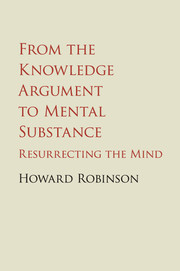Book contents
- From the Knowledge Argument to Mental Substance
- From the Knowledge Argument to Mental Substance
- Copyright page
- Dedication
- Contents
- Preface
- Book part
- Part I The power of the knowledge argument
- 1 Introducing the knowledge argument
- 2 Dennett’s denial of Mary’s ignorance
- 3 The abilities hypothesis and other functionalist strategies
- 4 Why Frank should not have jilted Mary
- 5 The phenomenal concept strategy
- 6 Davidson, non-reductive physicalism and naturalism without physicalism
- 7 Mysterianism, neutral monism and panpsychism
- 8 Conclusion
- Part II Why physicalism entails epiphenomenalism
- Part III Arguments for mental substance
- Bibliography
- Index
3 - The abilities hypothesis and other functionalist strategies
from Part I - The power of the knowledge argument
Published online by Cambridge University Press: 05 February 2016
- From the Knowledge Argument to Mental Substance
- From the Knowledge Argument to Mental Substance
- Copyright page
- Dedication
- Contents
- Preface
- Book part
- Part I The power of the knowledge argument
- 1 Introducing the knowledge argument
- 2 Dennett’s denial of Mary’s ignorance
- 3 The abilities hypothesis and other functionalist strategies
- 4 Why Frank should not have jilted Mary
- 5 The phenomenal concept strategy
- 6 Davidson, non-reductive physicalism and naturalism without physicalism
- 7 Mysterianism, neutral monism and panpsychism
- 8 Conclusion
- Part II Why physicalism entails epiphenomenalism
- Part III Arguments for mental substance
- Bibliography
- Index
Summary
- Type
- Chapter
- Information
- From the Knowledge Argument to Mental SubstanceResurrecting the Mind, pp. 36 - 56Publisher: Cambridge University PressPrint publication year: 2016



